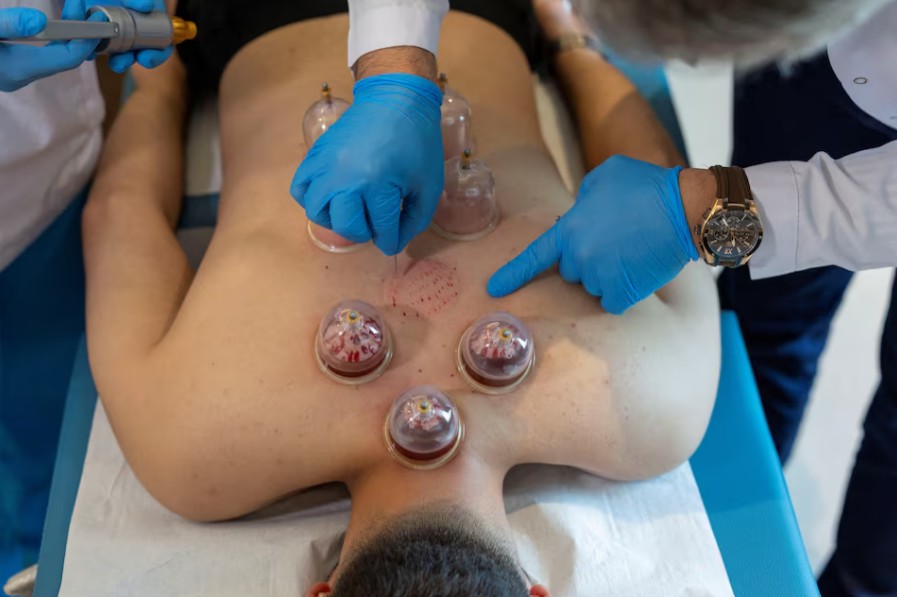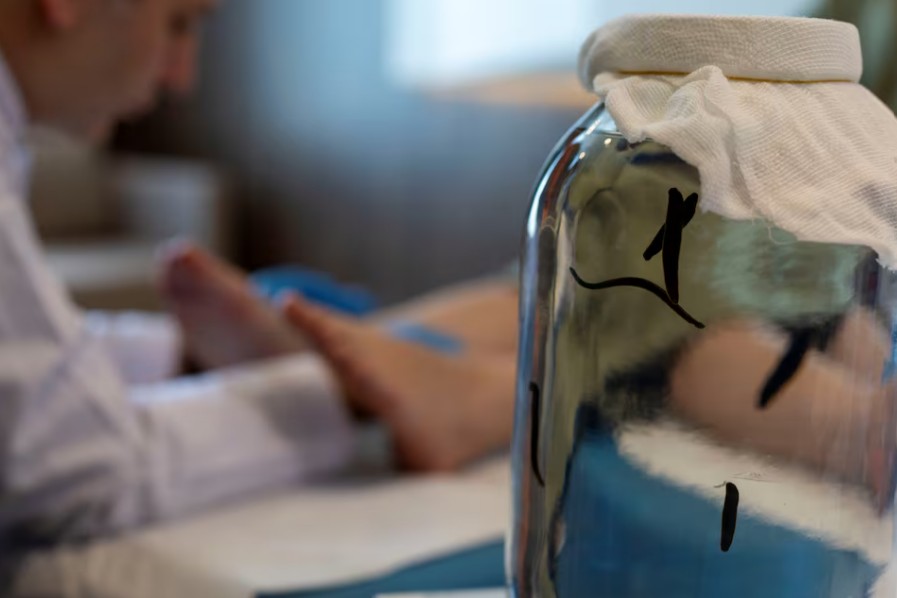In a brightly lit treatment room at a private hospital in Istanbul, Dr. Erdal Dilekci swiftly made small incisions on a patient's back, a step in the centuries-old practice of wet cupping.
The patient, 26-year-old nurse Furkan Ali Sayan, lay still as the doctor placed eight cups on his back, designed to draw out toxins and ease his neck and back pain. Over the next 15 minutes, the cups slowly filled with blood. "I haven't felt much yet, but I'm hopeful it will be effective in the next few days," said Furkan, undergoing the treatment for the first time.
 |
Dr. Erdal Dilekci, a specialist in physical medicine and rehabilitation at Medicana International Hospital, performs cupping therapy on Furkan Ali Sayan in Istanbul, Turkey, on 28/8. Photo: Reuters |
Dr. Erdal Dilekci, a specialist in physical medicine and rehabilitation at Medicana International Hospital, performs cupping therapy on Furkan Ali Sayan in Istanbul, Turkey, on 28/8. Photo: Reuters
In Turkey, wet cupping (known as hacamat) and other traditional treatments, such as leech therapy, are steadily finding their place in mainstream hospitals. The Turkish Ministry of Health reports that certified medical doctors in 66 of the country's 81 provinces are now qualified to administer these traditional methods in hospital settings.
Dr. Dilekci, a specialist in physical medicine and rehabilitation, is among hundreds of Turkish doctors integrating traditional and complementary medicine. "We use about 15 different methods, including ozone therapy, prolotherapy, acupuncture, and leech therapy," he explained at Medicana International Hospital. "These methods are regulated by the Ministry of Health and taught in official certification programs."
He emphasized that these practices do not replace modern medicine but are often used in conjunction with it, especially for chronic conditions like fibromyalgia, migraines, and joint pain. Treatment is personalized based on the patient's toxin levels, medication history, and response to previous sessions. Notably, cupping therapy is timed according to the lunar cycle to enhance effectiveness.
"We prefer the week after the full moon. Scientific studies have shown the moon's gravitational pull can support the efficacy of this method," the doctor stated.
Furkan opted for cupping to address pain from long working hours, feeling safer undergoing the procedure in a hospital setting. He admitted the most challenging part was the three-day pre-treatment diet, excluding meat, dairy, and eggs.
Such treatments were previously often administered by non-medical practitioners in Turkey. However, recent years have seen their increased integration into hospital environments under regulated medical supervision. Since 2014, the government has established training programs and regulations to ensure only certified doctors and dentists perform these procedures, protecting patients from infections and risks associated with unlicensed practitioners.
At the Istanbul hospital, Dr. Dilekci attended to another patient with circulatory issues. For this, he applied live black leeches from distilled water, most of which quickly attached to the patient's leg.
He explained that leeches secrete enzymes like hirudin, a natural anticoagulant, which improves blood flow and tissue repair. This method is favored by patients with varicose veins, lymphatic problems, and joint pain. According to the doctor, only certified leeches from sterile farms are used in the hospital, and they are disposed of after a single treatment to prevent cross-contamination.
Dr. Dilekci noted that due to standardized procedures and strict government oversight, these therapies have gained credibility, attracting patients from Europe, the Middle East, and Central Asia. The World Health Organization (WHO) also recognizes the role of traditional, complementary, and integrative medicine in improving health and quality of life. The WHO believes that if scientifically integrated into national health systems, these therapies can enhance the quality of healthcare.
 |
Dr. Dilekci performs leech therapy on Seyda Yilmaz in Istanbul, Turkey, on 28/8. Photo: Reuters |
Dr. Dilekci performs leech therapy on Seyda Yilmaz in Istanbul, Turkey, on 28/8. Photo: Reuters
Binh Minh (Reuters)












